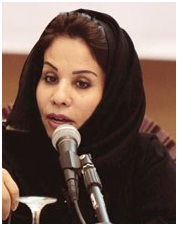By Prof. Fawziah Al Bakr
The story of the little girl Lama that was sexually abused and murdered by her father, who is now in prison awaiting trial, and other recurrent stories like it, show the power of men in this society and their capability of harming weaker parties unable to defend themselves due to lack of awareness, mechanisms and laws that protect children and women from all kinds of harassment and abuse.
The story of the little girl Lama that was sexually abused and murdered by her father, who is now in prison awaiting trial, and other recurrent stories like it, show the power of men in this society and their capability of harming weaker parties unable to defend themselves due to lack of awareness, mechanisms and laws that protect children and women from all kinds of harassment and abuse.
Societies are based on families caring for their children. A father
and mother’s immediate responsibility in every family is to care for and
nurture their children, but that is not what occurs in all cases. In
Saudi Arabia, there is a need to form laws that protect weaker entities
within the institution of the family. The absence of such laws produce
cases like Lama, who die waiting for justice, and this absence of
legislation will keep producing others like Lama we may or may not know
about.
In the past, it was acceptable and feasible to address similar cases
within the context of the family and neighborhood due to the small
population of Saudi at that time and the simplicity of the social
system. This is no longer possible in this day and age. The population
of Saudi has grown enormously and every family within this modern
lifestyle system has practically barricaded themselves inside their
cement homes, isolated from others around them. Many negative lifestyle
options have now become accessible such as drug use and alcohol while
the legal system has not caught up by implementing legislation, protocol
and social services to prevent and protect against abuse and neglect.
Our modern times have seen a shift in how we define and view terms
like childhood, abuse, neglect and other terms relating to rights in
modern social institutions. Our generation was subjected to many forms
of verbal and (maybe physical) abuse from teachers, parents, relatives
and neighbors according to the prevailing intellectual structure of the
society; as the Arabic proverb goes the meat is for the teacher and the
bones for the parents. If at that time society did not criminalize many
forms of abuse, today there is no room for such practices, even if it is
for noble goals. No one can hit a child under the pretext of
disciplining or slap a teenager under the pretext of returning him or
her to their senses, let alone deliver deliberate harm or neglect or
sexual abuse as poor Lama faced that left her body lying in the morgue
for four months!!
It is time to wake up. Such practices must be criminalized because it
is a crime in our modern time’s definition. Many of the frighteningly
light court rulings on cases of domestic abuse do not correspond to the
severity of the crime. Civil and Shariah laws should be updated to catch
up with Saudi society’s intellectual shift in the understanding of
rights and duties. All kinds of abusive behavior against children and
women should be clearly identified by law makers and Sharia laws and
codified.
There is an immediate need to call for a draft law that clearly defines all
forms of abuse including verbal, psychological, physical, and sexual
abuse and other forms of sexual harassment and abuse that women and
other minorities in society face.
We have grown weary of hearing about the Lamas of our society. Their
stories, reverberated by the newspapers and satellite channels,
nationally and internationally, have created an awareness among society
regarding the lack of a basic law for the protection against abuse. It
is high time for legislation to cover this deficiency. Saudi Arabia has
signed many international treaties that ensure basic human rights for
all and rejects any kind of discrimination. Islamic laws also emphasize
the protection of rights for all. Our shared religion and these treaties
could help us to initiate laws against neglect and abuse that many have
long waited for.
Prof. Fawziah Al Bakr has had a long history in human rights activism. She is a professor of education
at King Saud University. She is also a writer who spent three months in
prison for her columns. You can read a translation of her article on gender apartheid here and you can follow her on Twitter here.


No comments:
Post a Comment